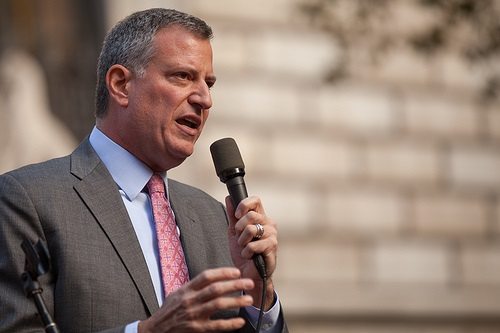
March 12, 2014; Education Opportunity Network
For charter school acolytes, New York City Mayor Bill de Blasio has become the nation’s bête noire. The controversy stems from de Blasio’s concern about the co-location of charter schools in public schools, with the possibility that the charters end up forcing some of the pupils of traditional public schools out of their classrooms. Charter school network operator Eva Moskowitz has been the mayor’s most nationally recognized critic, especially since some of the charter schools she runs apparently lost the mayor’s approval for co-locations.
But is Mayor de Blasio really all that anti-charter? Diane Ravitch reports that de Blasio, “having inherited 45 co-locations, decided to approve 36 of them.” For new charter schools, approvals went to 14 of 17 applications, including five of eight of those pitched by Moskowitz’s Success Academy chain. At a minimum, de Blasio seems to have retained charter schools, even Moskowitz’s, in his “education toolbox.”
Writing for EON, Jeff Bryant adds something about the Success Academy schools that ought to generate some interesting discussion. Charter school advocates have done such a good job in branding their product that often people don’t examine what the different charter schools do and how they operate. Bryant noted, for example, that Moskowitz’s schools “have reputations for practicing ‘zero tolerance’ discipline policies that often target special education students for harsh punishments such as suspensions and expulsions.” He cites Daily News reporter Juan Gonzales who revealed that Moskowitz’s Harlem Success Academy elementary school suspended 22 percent of its pupils at least once in the 2010-2011 school year, compared to a three percent average for regular elementary schools in the district. Bryant also documents the high attrition rates at Moskowitz’s school, concluding that the Success Academy has “a troubling track record with special education students and a troublesome tendency to push out students.”
Sign up for our free newsletters
Subscribe to NPQ's newsletters to have our top stories delivered directly to your inbox.
By signing up, you agree to our privacy policy and terms of use, and to receive messages from NPQ and our partners.
De Blasio has his critics going off the deep end. Bryant quotes Peggy Noonan, the former speechwriter for President Reagan, “calling de Blasio a ‘small and politically vicious man’ who ‘doesn’t like charter schools’ because ‘they are too successful to be tolerated.’” Apparently Noonan, the author of George H.W. Bush’s “kinder, gentler nation” catchphrase, doesn’t feel that kindness or gentility is due the “small” de Blasio, who stands six-foot-five.
The mayor has hardly done away with charter schools in New York City, regardless of what Moskowitz says and Noonan writes. But what about the zero-tolerance policy that the Harlem Success Academy promotes? Just this past January, Attorney General Eric Holder and President Obama’s prime supporter of charter schools, Secretary of Education Arne Duncan, described the administration’s concerns about zero-tolerance policies in schools.
“The need to rethink and redesign school discipline practices is frankly long overdue,” Duncan said. Criticizing the overuse of suspension, expulsion, and arrest, Duncan said that racial discrimination in school discipline is “a real problem today—it’s not just an issue from 30 or 40 or 50 years ago.”
“Too often, so-called zero-tolerance policies, however well-intentioned they might be, make students feel unwelcome in their own schools; they disrupt the learning process,” Holder added. “And they can have significant and lasting negative effects on the long-term well-being of our young people, increasing their likelihood of future contact with the juvenile and criminal justice systems.”
According to Donna St. George, who covered the Duncan/Holder announcement of new guidelines for the Washington Post, “Students of color and those with disabilities are disproportionately affected by discipline, federal data show. Among non-disabled students, African Americans are more than three times as likely as their white peers to be suspended or expelled.”
De Blasio may have removed some of the Bloomberg administration’s carte blanche support for charter schools taking up space and displacing students in regular public schools, but he hasn’t done away with charters by a long shot. However, given Bryant’s points about the Moskowitz’s chain’s suspension and expulsion policies, which we suspect are more prevalent among charter schools than not, the mayor might be well advised to look at the programs and operations of charter schools and dig into the good, the bad, and the ugly beneath the charter school brand.—Rick Cohen












